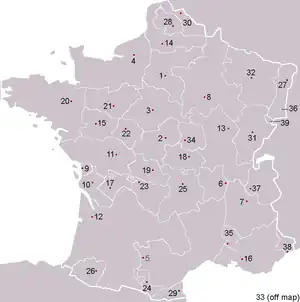| Lorraine and Barrois | |||||||||||||||||
|---|---|---|---|---|---|---|---|---|---|---|---|---|---|---|---|---|---|
| Government of Kingdom of France | |||||||||||||||||
| 1766[1]–1790[1] | |||||||||||||||||
.svg.png.webp) | |||||||||||||||||
| Capital | Nancy | ||||||||||||||||
| History | |||||||||||||||||
• Established | 1766[1] | ||||||||||||||||
• Disestablished | 1790[1] | ||||||||||||||||
| |||||||||||||||||
| Part of a series on |
| Lorraine |
|---|
 |
Lorraine and Barrois (French: Lorraine et Barrois) was a government of the Kingdom of France, formed in February 1766 from the duchies of Lorraine and Bar upon the death of Stanisław Leszczyński.[2]
History
1771 map of Lorraine and Alsace by Rigobert BonneArmorial of the members of the Sovereign Court of Lorraine and BarroisKing Louis XV of France (r. 1715–1774) had negotiated at the preliminaries of Vienna in 1735 "an arrangement by which Francis [III, Duke of Lorraine] received the duchy of Tuscany [...] in exchange for Lorraine, and Stanislaus Leszczynski, the dethroned king of Poland and father-in-law of Louis XV., obtained Lorraine, which after his death would pass to his daughter—in other words, to France."[2] The following year (1736), "by a secret agreement," Stanisław had "abandoned the financial administration of his estates to Louis XV. for a yearly subsidy."[2] Both treaties, however, guaranteed the legislation of Lorraine and Barrois, "the privileges enjoyed by the three orders, and their common law and customs tariffs, which they retained until the French Revolution."[2]
Meanwhile, the Three Bishoprics formed a little government.[2]
Barrois mouvant (composed of the bailiwicks of Bar and Bassigny) was under the jurisdiction of the Parlement of Paris whereas Barrois non-mouvant (i.e. the Bailiwick of Saint-Mihiel) and Lorraine were subject to the Sovereign Court of Lorraine and Barrois,[3] which became the Parliament of Nancy in 1776. There was also a chambre des comptes at Bar-le-Duc.[2]
References
- 1 2 3 4 Simon & Gérard 1967, p. 72.
- 1 2 3 4 5 6 Poupardin, René (1911). . In Chisholm, Hugh (ed.). Encyclopædia Britannica. Vol. 17 (11th ed.). Cambridge University Press. pp. 9–12, see page 12, lines 3 and 4.
At his death in February 1766 the two duchies of Lorraine and Bar became definitively incorporated in the kingdom of France.
- ↑ Marin Saugrain, Cl (1726). Dictionnaire universel de la France ancienne & moderne (in French). p. 999.
Sources
- Poupardin, René (1911). . In Chisholm, Hugh (ed.). Encyclopædia Britannica. Vol. 17 (11th ed.). Cambridge University Press. pp. 9–12.
- Simon, J.; Gérard, P. (1967). L'Armée à Nancy, 1633-1966: mélanges d'histoire militaire ... (in French). Berger-Levrault.[1]
- ↑ Simon & Gérard 1967, p. 72.



